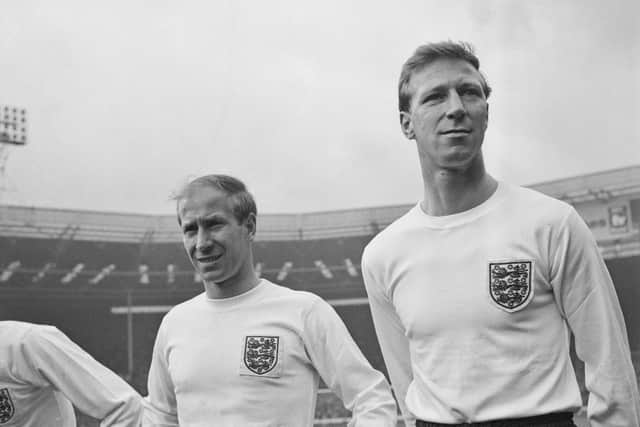Bobby Charlton: A Manchester United and England legend who transcended the game
Long after he stopped kicking a bag of air around for Manchester United in April 1973, even after the last of his professional appearances, in 1980, as he clung onto the game he loved by turning out for backwater clubs, “Bobby Charlton” was a byword for Englishness in foreign lands.
For all that Charlton will forever be associated with the club he made 758 appearances for and the country he won the World Cup with, he was a global icon who rose above football’s tribalism. On the weekend his death aged 86 was announced his name was chanted on terraces often hostile to his club, his loss felt way beyond these shores.
Advertisement
Hide AdAdvertisement
Hide AdHis football was brilliant - one of only nine players to win the World Cup, European Cup and Ballon d’Or award for Europe’s best player, all in the space of two amazing years - but what earned him most respect was his dignity, his sense of fair play (he was only booked twice), his interest in others and his enthusiasm for football.


It was why, when he realised he was not cut out for a second career in management after an unsuccessful stint as Preston North End’s player-manager, he became a much sought-after global ambassador, promoting Manchester’s bids for the 1996 and 2000 Olympic Games and 2002 Commonwealth Games, England’s for the 2006 World Cup and London’s for the 2012 Olympics, all as a knight of the realm.
Charlton’s life was shaped by tragedy and his finest footballing hour overshadowed by a personal sacrifice which allowed others to take the headlines.
Born in Ashington as a relative of the legendary Jackie Milburn, his talents were well-known as a schoolboy but it was Manchester United who won the fierce battle to sign him.
Advertisement
Hide AdAdvertisement
Hide AdIt nearly cost him his life aged 20, pulled from the wreckage of the Munich air disaster which claimed the lives of eight of his club-mates as they flew back from a European Cup quarter-final in Belgrade in 1958.
After losing close friends like South Yorkshireman David Pegg and personal idols like Duncan Edwards he was said to be a more dour character, losing his hair early save for his trademark combover. His relationship with elder brother Jack, who went on to be a Leeds United legend and World Cup-winning team-mate, was strained.
It did not stop him becoming one of the all-time great footballers, winning the first of 106 England caps two months later, and turned him into a talismanic figure of his club’s rebirth.
In 1958 he was largely used as a left winger but developed into a cultured attacking midfielder, making full use of a wonderful passing range and thunderbolt shots like the one which booked England’s place in the 1966 World Cup final, the second of two semi-final goals against Portugal.
Advertisement
Hide AdAdvertisement
Hide AdOnce there, his job was to cancel out West Germany’s best player, Franz Beckenbauer, leaving the limelight of the 4-2 win to hat-trick hero Geoff Hurst. But football appreciated his talents, naming him Europe’s best footballer that year.
His moment on Wembley’s centre stage came two years later when, a decade after Munich, he scored twice captaining the Red Devils to victory in the European Cup final, the first by an English club.
He was unable to follow it up at the 1970 World Cup where England arguably had a better side than four years earlier but, conscious of the effect the Mexico heat was having on his 32-year-old playmaker, Sir Alf Ramsey substituted him - widely regarded as a big factor in West Germany’s 3-2 win from 2-0 down in the quarter-finals.
On the flight home Bobby and Jack asked Ramsey to call time on their international careers. Bobby had scored 49 goals by that point, a mark not beaten until Wayne Rooney did so in 2015.
Advertisement
Hide AdAdvertisement
Hide AdEven from the fringes of the game in retirement, Charlton had a huge influence on it.
As well as working as a television pundit he set up the Bobby Charlton Soccer Schools which famously honed David Beckham, and was a director of Wigan Athletic, then his beloved Manchester United.
He was influential in persuading his fellow board members to appoint Alex Ferguson as manager in 1986, and to stand by him during some difficult early years before the Scot became one of the game’s all-time great managers, reviving the club’s glory years that had already faded when Charlton left.
Charlton was a regular sight at the Old Trafford director’s box, which sat in the stand renamed in his honour in 2016.
Advertisement
Hide AdAdvertisement
Hide AdIn November 2020 it was revealed he had dementia, the disease that took Jack that summer, and it was one of the sadnesses of his passing that Erik ten Hag revealed in the Bramall Lane press room on Saturday night that he had never met Charlton, the first Manchester United manager since World War Two not to have.
But the influence of one of the game’s great ambassadors lives on, a symbol not only of football but of common decency that spans the globe.
Comment: Page 12.
Words by Stuart Rayner, Yorkshire Post football writer.
